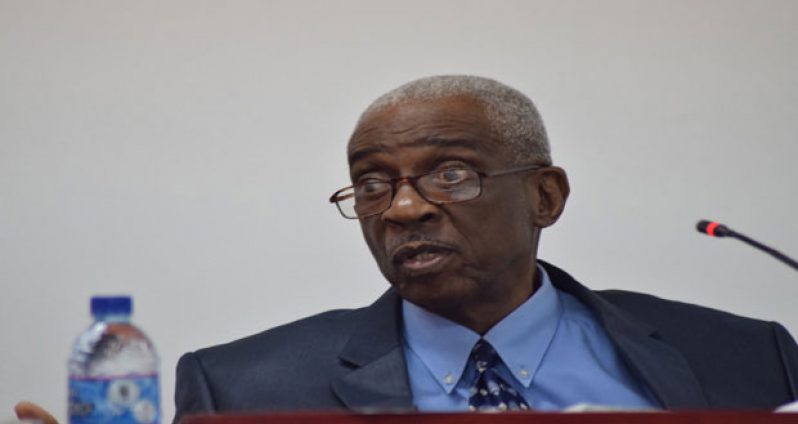By Shauna Jemmott
WHILE many prisoners on parole have been released, the Commissioners of the Guyana Prison Service Commission of Inquiry (CoI) believe that decisions to release such prisoners are many times an unfair consideration of pardon.The report also criticized the efforts of the Ministry of Public Health in recommending the freedom of prisoners based on ill-health.
“The Ministry of (Public) Health, which has the power to demand the release of prisoners on health grounds, offers minimal services to the prison, despite a sizeable component of mentally ill, HIV positive and drug substance-addicted prisoners,” the report stated.
The CoI report was presented to President David Granger earlier this month by Chairman of the Commission Justice James Patterson. The other Commissioners were former Director of Prisons Dale Erskine and Human Rights Activist Merle Mendonca. The CoI was done following the deaths of 17 inmates during the unrest and fire at the Camp Street prison on March 3. The prisoners were mostly responsible for the deaths, the CoI found, but it also highlighted a number of institutional deficiencies.
GENDER IMBALANCE
The Commissioners said statistics reveal that the policy decisions on parole give priority to narcotics offenders rather than considering solely the merits of each individual case, and also reflect a gender imbalance.
“In this respect, parole is employed as a counterbalance to the injustice flowing from mandatory custodial sentences attracted by narcotics offences… Figures for 2013 also suggest that a high percentage of the women recommended for parole were serving sentences for narcotics-related offences (9 of the 11 granted parole). Only one male of the sixty-nine applications received in 2013 was paroled,” the report stated.
The prison has long been in a critical state with overcrowding being one of the dominant issues. The Commission has recommended that Government should create a High Level Committee charged with reducing the cancer of over-crowding, while aiming to ‘strengthen the professional capacity of the Guyana Prison Service to respond to its diverse challenges as its main purposes.
While daily life in Lot 12, Camp Street is “indescribably harsh”, the report states that prisoners “spend most of their day in spaces which are occupied by three, four and five times more people than they intended to accommodate. Internal mobility in the prison decreases as the prison population increases.”
While a total of twelve persons were granted parole that year, figures reflected a contrast with the high number of manslaughter offenders, totaling 29, attracting only one positive recommendation for parole, while eight of those were denied and twenty of the applications unresolved.
Sixty-nine applications were made for parole by prisoners with those serving sentences for manslaughter, murder, and narcotics dominating the applications.
The report also pointed out that the a number of applications were made over one year before being processed, with only twenty-seven of the sixty-nine applications received in 2013 being processed to date. Commissioners question the institutional mechanism and how capable it is in accomplishing the purpose of placing prisoners on parole, which it says is “a stimulus towards good behaviour on the part of offenders and an encouragement for rehabilitation.”
PAROLE PROCEDURES
“The numbers of cases which take longer than a year to process point to deficiencies in either the parole procedures or in the support system available to the Parole Board… The concern of the CoI is not with the dedication or efforts of the members of the Parole Board but with the institutional mechanism and its fitness…”
It seriously questions the parole programme since reports indicate that the difference between maintaining a prisoner in the jail, and maintaining one on parole is just $15,000, according to the reports of the Parole Board and the Guyana Prison Service Strategic Plan.
The CoI Report indicates that the Parole Board Report for 2009 gave the operational cost for the Parole Board, (excluding any costs of monitoring of parolees) as G$3,789,600,000, with the number of parole cases recommended for parole in that year being eleven.
“It is reasonable, therefore, to say that the per capita cost of releasing a prisoner on parole for that year was the budget sum $3,290,000, divided by 11, namely G$344, 509,” the report states.
“In comparison, the Guyana Prison Service Strategic Plan 2010-2013 notes that the average per capita figure for maintenance of a prisoner in 2009 was G$359,301. The difference between maintaining a person in prison and the process of recommending parole is less than G$15,000 per year, prompting serious questions with respect to the parole programme.”
The report also states that prison records over a ten-year period indicate that only a quarter of the average number of parole applications received annually received favour, but while changes have been positively evident within the past three years, overall numbers released are still too low to make the parole system an ‘effective incentive towards good behaviour’.
“… the overall average for the decade is seven granted parole of an average of twenty-four applications, whereas in the last three years for which Reports are available, the figures are ten granted parole of thirty-one applications,” the report notes.



.jpg)








